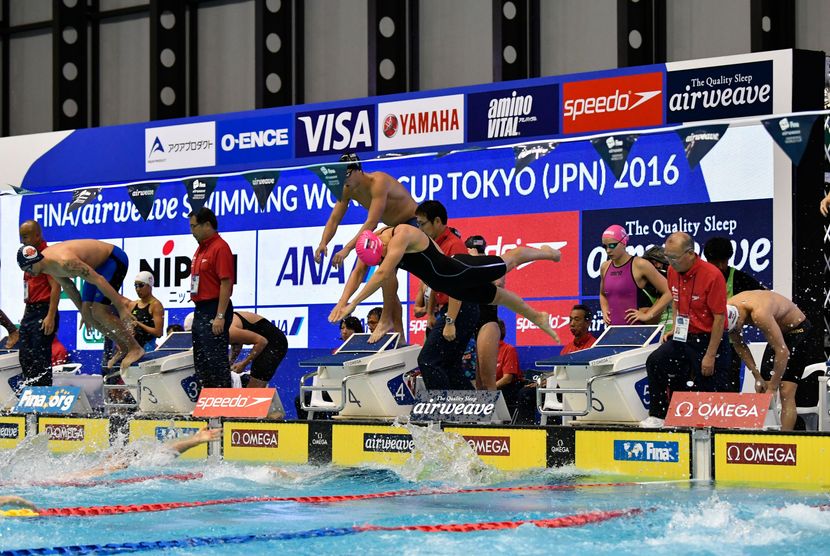
Katinka Hosszu (HUN) bagged four golds and a bronze from five finals as the Tokyo (JPN) leg of the FINA/airweave Swimming World Cup kicked off on Tuesday.
Hosszu led from the off in the 200m free, coming home in 1:53.34, and 1.11 ahead of Australia’s Madison Wilson.
The Iron Lady then tasted defeat in the 100m fly as Kelsi Worrell of the US touched home ahead of Jeanette Ottesen (DEN) and Hosszu. Fourth-placed Rikako Ikee, of Japan, set a World Junior Record of 56.42.
The Hungarian was back on the winner’s podium when edging out archrival Emily Seebohm, clocking 26.23 versus the Aussie’s 26.30, in the 50m back.
She later triumphed in the 200m IM (2:04.56) and the 200m back (2:01.72), holding on from the fast-finishing Seebohm in the latter.
“I am delighted, of course. I feel stronger and stronger as we go round the World Cup — I’m not going to lie, it’s been a long one! But I like the Tokyo stop, I like to get up early in the morning to race,” said Hosszu
She intends to compete in all events on Wednesday, except the 50m and 200m breast.
In spite of her world junior mark, Ikee was a little downbeat afterwards.
“I was aiming to break the Japanese record, but my body didn’t move as I wanted, and I missed by 0.33. I didn’t do as well as I hoped on day one, so I’m a little worried about day two, but I’ll try my best,” said the 16-year-old.
Olympic champion Kyle Chalmers (AUS) sliced almost half a second off the World Junior Record he set in Singapore only four days earlier, when landing the 100m free in 46.12, edging out the men’s overall World Cup series leader, Vladimir Morozov (RUS), who clocked 46.15.
“Do you know what? I was definitely feeling a lot worse than when I was in Singapore, so it just goes to show it doesn’t matter how you feel going into the race, as long as you put your mind to it,” said18-year-old Chalmers.
“My coach said to me this morning, after I scraped into the final in eighth place, just put a little emotional effort into it tonight. I’m very happy with that outcome.”
Morozov gained compensation when ripping through the 100m IM in 50.55, more than a second clear of his closest pursuer, Japan’s Shinri Shioura, and just shy of breaking his World-Best 50.30.
“Finishing three-hundredths behind the Olympic champion is not so bad, then I tried to bounce back and get as close as I could to the World Record — it was very close,” said Morozov, who said he may try something new in Hong Kong.
“Actually, I’m thinking to maybe try to swim other events at the next stop — 50 fly, 50 breast — see what I can do in those.”
Third in the 100m IM was Daiya Seto. Either side of that, the Japanese swimmer delighted the crowd when defeating Chad le Clos (RSA) in the 200m fly in 1:49.93, and going clear in the 400m IM, stopping the clock at 4:03.42, pursued by Hungary’s Gergely Gyurta in 4:04.28.
Seto felt fatigued and was concerned about his prospects on the second day, adding:
“It seems that I’m tired. My head is trying to tell me I’m not tired, but my body doesn’t agree. In the 400 I wanted to go below four minutes, but I wasn’t able to do that. Now we’re in Japan, the home of onsen natural springs, so I want to take a bath in one!”
Conquered by Seto in the 200m fly, Le Clos blitzed home in 22.30 to win the 50m version. Le Clos, a triple FINA World Cup overall series winner, looks destined to finish runner-up to Morozov this time, but continues to feel an affinity for the competition.
“I’m never happy when I get second. In the 200, I felt really good the first 100, but the third 50 was like I had a piano on my back, and 29.42 is a long-course split, so I think that’s where I went wrong. I gave him a bit too much in that third 50,” said the South African.
“I love the World Cup, it’s a great competition — being able to travel while getting some racing in. Of course, the money’s good, but it’s a good opportunity to improve the smaller things, your starts, get sharper. I’m excited for the final leg in Hong Kong, and excited for next year’s World Cup.”
Aussie Mitch Larkin landed the 100m back in 50.23 as he continues his comeback from a post-Rio break. Larkin had been favourite for 100m and 200m back gold at the Olympics, but finished fourth and second respectively.
“I’ve been back in the water two weeks since Rio so it’s good to just get some racing in, but maybe I would have liked to have been a bit quicker. I think I was out a bit slow, and some of my turns were a bit long, but that’s racing,” he said.
“Looking back I’m really proud of how the week in Rio panned out. For me it was a bit of an emotional roller-coaster, ups and downs. I learned a lot about myself which is really good. I'm going to be a bit patient with my swimming now, take some time off, and if I’m not 100% fit next year at the trials then so be it.”